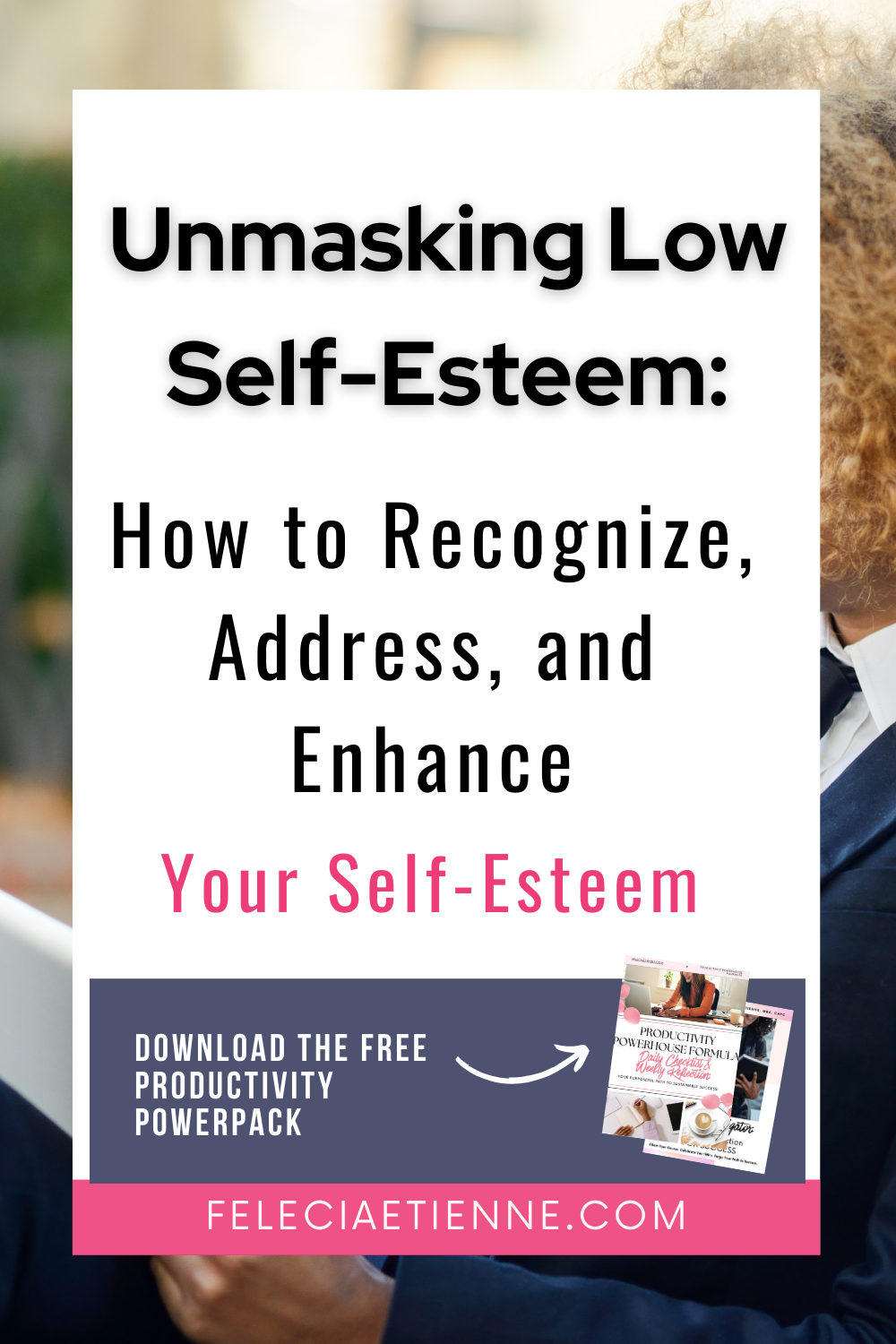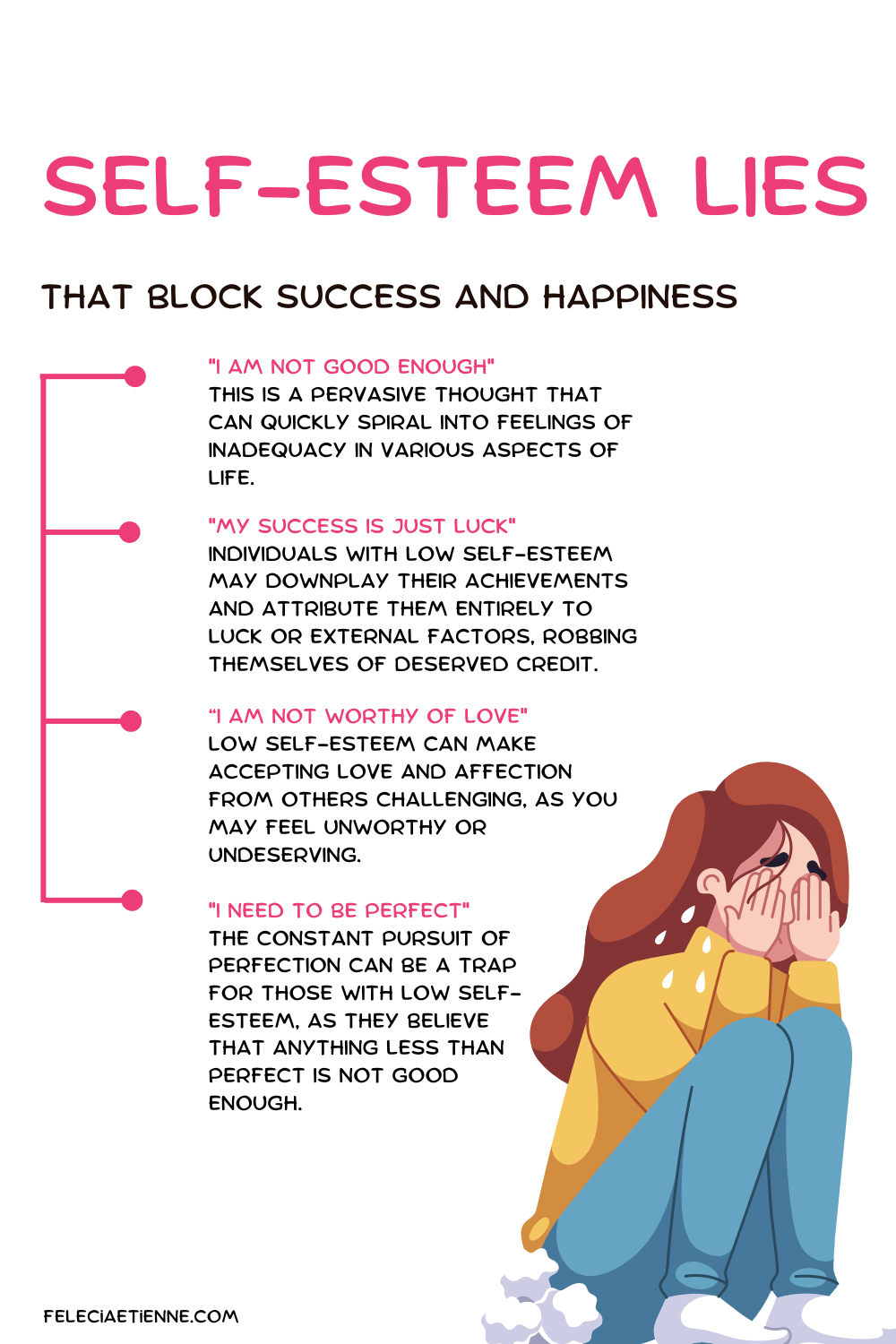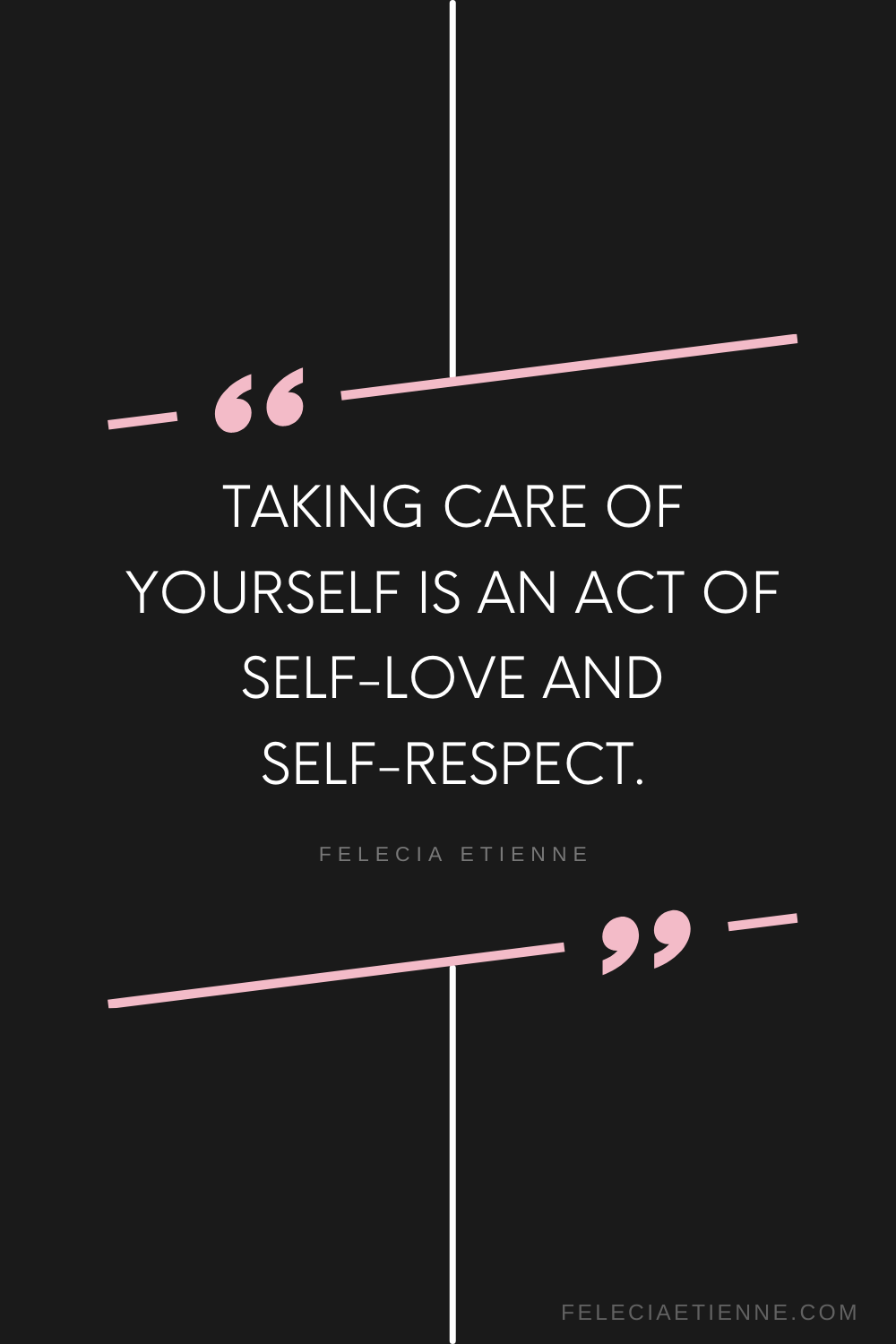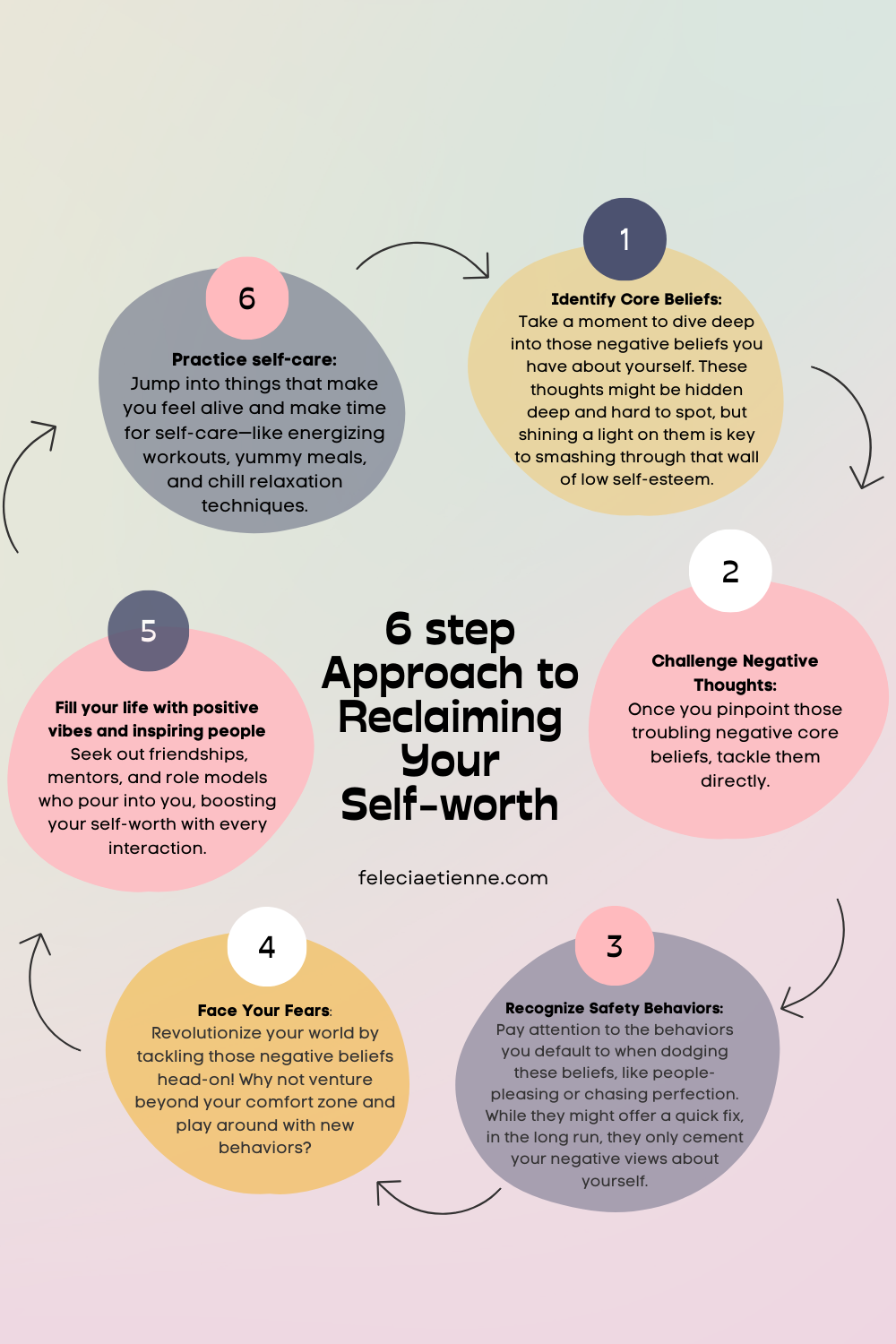Unmasking Low Self-Esteem: How to Recognize, Address, and Enhance Your Self-Esteem
Building Unshakeable Confidence: 19 Strategies for Cultivating Self-Confidence
Do you struggle with feelings of unworthiness and self-doubt? You are not alone. According to research, nearly 85% of people worldwide experience a lack of confidence and low self-esteem at some point. Low self-esteem is a silent predator that can quietly erode the joy and confidence in your life.
Low self-esteem can significantly impact mental health, relationships, and overall well-being, whether due to societal pressures, past experiences, or negative self-talk. However, the good news is that you have the power to change how you feel about yourself by understanding the root causes of low self-esteem and implementing effective strategies to improve it.
In this blog post, we will unmask low self-esteem and explore practical ways to recognize, address, and enhance your sense of self-worth. Gear up for a journey to build a healthier relationship with yourself!
Why is Self-Esteem Important?
“Self-esteem is not about believing you are perfect, but accepting and loving yourself as a perfectly flawed human being.”
Self-esteem shapes how you make decisions, navigate relationships, manage your emotions, and how you feel about yourself. It's the secret sauce to motivation, too. When you see yourself in a positive light, you realize your true potential and feel excited to tackle new challenges. High self-esteem means having a positive self-image and belief in your capabilities, while low self-esteem involves negative self-perceptions and feelings of inadequacy. Self-esteem is crucial because it impacts your thinking, feelings, and behavior. Low self-esteem can affect every aspect of your life – from your relationships and career to your physical and mental well-being.
Understanding Low Self-Esteem
“Healing from low self-esteem starts with acknowledging and addressing the root causes, but it also requires daily acts of self-love and compassion.”
Self-esteem is how you see yourself, including your thoughts on your value, skills, and inherent worth. While some folks have a strong sense of their own worth, others struggle with feelings of not being enough and widespread self-doubt.
Low self-esteem is when you just can't seem to find that confidence and belief in yourself. It's that nagging feeling of never being good enough, smart enough, or worthy enough. Ever find yourself constantly measuring up against others and always coming up short? That's low self-esteem at work, tricking you into undervaluing your own worth. It's a sneaky enemy that can lead you down a rabbit hole of perfectionism, self-sabotage, and a paralyzing fear of failure.
Self-Esteem vs. Self-Worth
“Self-worth is the foundation upon which self-esteem is built. Discovering your true worth is the key to unlocking your full potential. It’s time to embrace your value unapologetically and shine!”
You must understand the distinction between self-esteem and self-worth. Self-esteem involves how you view yourself and your confidence levels, which are influenced by external factors like accomplishments and relationships. On the other hand, self-worth is an internal perception of your value and dignity as an individual, which remains unwavering despite external circumstances. By recognizing this difference, you can cultivate a more holistic view of yourself and nurture a deeper sense of self-awareness and acceptance.
8 Self-Esteem Lies that Block Success and Happiness
“Believing in yourself is the first step towards building a strong and healthy self-esteem.”
Low self-esteem often shows up in your thoughts, behaviors, and attitudes towards yourself.
Here are eight common lies that people with low self-esteem may believe:
"I am not good enough": This pervasive thought can quickly spiral into feelings of inadequacy in various aspects of your life.
"My success is just luck": If you struggle with low self-esteem, you might find yourself downplaying your achievements and attributing them entirely to luck or external factors, robbing yourself of the credit you deserve.
"I need to be perfect": The constant pursuit of perfection can trap you, especially if you struggle with low self-esteem, making you believe that anything less than perfect is not good enough.
"I am not worthy of love": If you struggle with low self-esteem, accepting love and affection can feel challenging because you might see yourself as unworthy or undeserving.
"I am a failure": Constantly criticizing yourself and comparing yourself to others can make you feel like a failure, regardless of your achievements.
"Others' opinions define my worth": If you're battling low self-esteem, you might often find yourself in a relentless search for validation and approval, letting external opinions dictate your self-worth instead of trusting in your own beliefs.
"I am not as good as others": This thought can lead you to constantly compare yourself to others and feel inferior, causing you to doubt your abilities and worth.
"I don't deserve happiness": Low self-esteem can challenge your belief in deserving happiness and fulfillment, leading you to self-sabotage and experience a lack of motivation.
How Low Self-Esteem Manifests: 14 Signs of Low Self-Esteem
“The secret to conquering low self-esteem lies in mastering the art of self-compassion.”
Identifying low self-esteem can be challenging, as it often manifests in subtle behaviors and thought patterns that may go unnoticed. Paying attention to both external cues and your internal dialogue is important to recognize the signs.
Here are 14 common signs that may indicate low self-esteem:
1. People-Pleasing
Do you ever find yourself constantly striving to please others, seeking their approval to feel a sense of worth? If so, this could be a significant indicator of low self-esteem. Relying heavily on external validation to gauge your self-worth suggests you may be in a perpetual chase for affirmation. This endless pursuit can lead to heightened stress and anxiety, especially when the sought-after approval is not forthcoming. It's crucial to recognize this pattern as it can take a toll on your mental health, pushing you into a cycle of dependency on others' perceptions to feel valued and accepted.
RELATED ARTICLE: The Foundation of You: Exploring Self-Esteem, Self-Worth, and Self-Confidence for a Life of Fulfillment
2. Self-Consciousness
“Believe in your worth, and the world will too.”
Being constantly self-conscious about your appearance, actions, or words is a significant indicator of low self-esteem. This heightened level of self-awareness can lead to pervasive feelings of discomfort in social situations, where the fear of judgment and high self-doubt become overwhelming. As a result, individuals may find themselves avoiding certain activities or social gatherings altogether, missing out on opportunities for social interaction and growth due to these insecurities. This cycle of avoidance and self-doubt can further reinforce feelings of low self-worth, creating a challenging barrier to overcome.
3. Excessive self-criticism
“Own your uniqueness; it’s the secret password to your superpowers.”
If you're struggling with low self-esteem, you might often find yourself grappling with a relentless inner critic. This internal adversary is constantly on your case, meticulously highlighting every single imperfection and error. It's as if there's a voice inside your head that refuses to let you forget even the smallest of missteps, magnifying them to feel insurmountable. This type of negative internal dialogue can severely impact your mental health, leading to a pervasive sense of inadequacy and self-doubt. Over time, this relentless negativity can erode your confidence, making everyday interactions and challenges feel more daunting. Ultimately, this can significantly alter your overall vibe, casting a shadow over your perspective on life and your interactions with others.
4. Negative body image
“Celebrate your flaws as unique brush strokes on the masterpiece that is you!”
Stepping out of your comfort zone can light up a new kind of bravery in you. Facing your fears and going for those calculated risks can seriously amp up your courage and give you rock-solid confidence. Think about starting with small steps that nudge you out of your safe space, maybe by trying something new or speaking out in a meeting. Every challenge you meet and conquer not only builds your resilience but also broadens your comfort zone, setting you up for even bigger leaps in the future. Remember, being courageous doesn't mean you're not scared; it's all about being bold enough to move forward even when you are. So, why not ask yourself: What fears or challenges am I ready to tackle? How can I push myself to confront them and flex my courage muscle?
5. Difficulty setting boundaries:
“Speak out for what you need and establish clear boundaries to protect your self-esteem.”
If you're struggling with low self-esteem, you might find it hard to assert your needs and set clear boundaries in your relationships. This difficulty can make you feel taken advantage of or as though you're not receiving the respect you deserve. Consequently, you might end up in unfulfilling or even harmful relationships, which can worsen your self-worth issues and potentially lead to a vicious cycle of negative interpersonal experiences. Remember, you're not alone in this journey.
6. Difficulty Asserting Needs
“Feeling overlooked is a sign to start advocating for yourself. Break the cycle, assert your worth.”
Much like the challenge of establishing boundaries, if you struggle with low self-esteem, you might find it hard to assert your needs and advocate for yourself. This difficulty in voicing your desires and opinions can lead to feeling overlooked or undervalued in your relationships. Consequently, this dynamic can exacerbate feelings of low self-worth, creating a cycle that's hard to break. It's crucial for you to learn and practice self-assertion techniques to improve your interpersonal interactions and overall sense of self-value.
RELATED ARTICLE: Why Setting Boundaries Is So Damn Important (And How To Do It Right)
7. Focus on Weaknesses
“Focus on your unique strengths, not your perceived flaws.”
If you're struggling with low self-esteem, you might find yourself focusing more on your perceived flaws rather than celebrating your unique strengths. This skewed focus can lead to a detrimental cycle, where your accomplishments go unnoticed, overshadowed by an overwhelming sense of inadequacy. This relentless feeling of never being good enough can hinder your personal growth, as it stifles the confidence you need to embark on new challenges and opportunities.
8. Perfectionism
“The relentless pursuit of perfection, fueled by a fear of failure, sets an impossible standard, leading to a cycle of stress, anxiety, and burnout.”
If you're chasing perfection, you're not alone. Many of you may find yourselves driven by a fear of failure or not meeting societal expectations. You might set impossibly high standards, believing that meeting them is the only way to be valued or accepted. However, this pursuit can lead to stress, anxiety, and even burnout, since perfection is inherently unattainable. It sets up a cycle of continuous disappointment and self-criticism. Remember, you're in this together, and it's okay to step back from the pursuit of perfection.
RELATED ARTICLE: Procrastination Liberation: 10 Science-Backed Strategies to Crush Perfectionism and Boost Productivity! (Who doesn't want to beat procrastination?)
9. Comparing oneself to others:
“Break the cycle of self-doubt by identifying and challenging your core beliefs. You are worthy of self-love and acceptance.”
If you're suffering from low self-esteem, you might find yourself frequently engaging in detrimental comparisons with others, leading to persistent feelings of inferiority or envy. This harmful habit not only exacerbates your sense of inadequacy but also fuels a vicious cycle of negative self-talk. Such comparisons often overlook your unique qualities and achievements, focusing instead on perceived shortcomings. Over time, this can significantly erode your self-confidence and hinder your personal growth, making it difficult for you to recognize and celebrate your own successes and strengths.
10. Self-isolation
“In the dance of life, don’t sit out because you fear the judgment of others. Each step, each misstep, is a part of your unique rhythm.”
When you grapple with low self-esteem, you might find yourself withdrawing from social situations and isolating from others. This behavior is often driven by a deep-seated fear of being judged or criticized by those around you. You might also feel unworthy of forming or maintaining relationships, believing that you do not meet the expectations of others or deserve their company. This sense of unworthiness and fear can create a cycle of isolation, further exacerbating your feelings of low self-esteem.
11. Procrastination
“Self-esteem grows not from avoiding mistakes, but from learning and growing through them.”
If you often find yourself procrastinating, it might be a sign of low self-esteem leading to avoidance behaviors. This creates a hard-to-break cycle where procrastination serves as a defense mechanism to avoid facing potential failure or criticism. By putting tasks off, you may temporarily shield yourself from negative outcomes, but this strategy often backfires. The delay in completing tasks can leave you feeling unproductive and inadequate, intensifying negative self-talk and further eroding your self-esteem. This cycle is particularly damaging as it reinforces the very fears and doubts that triggered your procrastination in the first place, creating a vicious circle of avoidance and self-criticism.
12. Indecisiveness
“Self-worth is the foundation upon which self-esteem is built. Discovering your true worth is the key to unlocking your full potential. It’s time to embrace your value unapologetically and shine!”
If you're suffering from low self-esteem, you might find yourself struggling with making decisions and may have a profound difficulty in trusting your own judgment. This indecisiveness can lead you to feel stuck, as you're often unable to choose a course of action without enduring considerable stress and anxiety. Moreover, your lack of confidence in your own decisions might drive you to seek constant validation from others, making it challenging to feel secure in your choices and paths in life. This cycle of seeking external approval can exacerbate your feelings of inadequacy and further impair your ability to trust in your own capabilities.
13. Imposter Syndrome
“The greatest validation comes from within yourself, when you realize your worth and potential.”
Have you ever experienced the sensation of just faking it, feeling as though you don't truly deserve your achievements, despite everyone around you praising your success? That unsettling feeling is known as imposter syndrome.It's pretty common for folks to doubt their own achievements and worry about being called out as a fraud, despite having plenty of proof that they're totally competent.This syndrome frequently affects people who struggle with low self-esteem, particularly those who find it challenging to internalize their successes. It's a psychological pattern that can hold you back, making you feel unworthy of the accolades and achievements you've rightfully earned. Many people grapple with this, especially if they're battling internal feelings of inadequacy or struggling to genuinely feel good about themselves and their accomplishments.
RELATED ARTICLE: THE POWER OF IMPOSTER SYNDROME: HOW TO USE IT TO YOUR ADVANTAGE
14. Feeling Guilty about taking some me-time
“Taking care of yourself is an act of self-love and self-respect.”
Individuals suffering from low self-esteem might experience feelings of guilt when they attempt to prioritize their own needs or engage in self-care activities. This guilt often stems from a deep-seated belief that they are not worthy or deserving of investing time and resources in themselves. This lack of self-worth can be a significant barrier to personal growth and happiness, as it prevents individuals from recognizing their own value and the importance of their well-being.
Unpacking the Roots of Low Self-Esteem
“The journey to self-worth begins with embracing your uniqueness and realizing that you are the masterpiece only you can create.”
Understanding the underlying causes of low self-esteem is a crucial step in addressing and improving it. While no single factor leads to low self-esteem, some common experiences and thought patterns can contribute to its development.
Here are 10 potential root causes of low self-esteem:
Childhood experiences:
Your early years play a crucial role in shaping your sense of self. Experiencing trauma or neglect, such as emotional or physical abuse, constant criticism from caregivers, and unrealistic expectations from authority figures, can significantly impact your self-esteem and overall well-being. These experiences may lead to feelings of inadequacy, self-doubt, and internalized negative beliefs about yourself. It's important to address and process these past experiences to foster a healthier self-perception and personal growth.
The Role of Adulthood Experiences:
While your early experiences lay the foundation for self-esteem, the experiences you encounter in adulthood can also significantly influence your perception of self-worth. Emotionally abusive relationships, for example, can chip away at your confidence and reinforce negative beliefs about yourself. Even with a supportive upbringing, you might face challenges that shake your self-esteem later in life.
Social media and societal standards:
In today's digital world, you've likely felt the intense pressure social media puts on you, pushing you to compare yourself to others constantly. The polished images you scroll through often present an idealized, unrealistic version of life, making you feel inadequate and trapping you in an endless cycle of comparison.
Personal relationships:
Negative or toxic relationships can take a toll on your self-esteem. It doesn't matter if it's a romantic partner, family member, or friend; constant criticism and demeaning behaviors can slowly eat away at how you see yourself and lead to low self-esteem.
Perceived failures:
Experiencing perceived failures, whether in school, work, or personal endeavors, can lead to low self-esteem. Such setbacks may cause you to question your abilities and worth, leading to self-criticism and negative self-talk.
Traumatic events:
Going through tough stuff, like losing someone or getting hurt, can mess with your self-image. These challenging moments can leave you feeling vulnerable, powerless, and not too great about yourself.
Mental health struggles:
Facing mental health challenges like depression and anxiety can sometimes feel like it's chipping away at your self-esteem. It's like these conditions have a way of distorting how you view yourself, painting your thoughts with broad strokes of negativity about your value.
Unrealistic expectations:
Having too high expectations for yourself can also lead to feeling not so great about yourself. When we constantly strive for perfection or hold ourselves to unattainable standards, we set ourselves up for disappointment and feelings of inadequacy.
Lack of positive reinforcement:
Growing up in an environment where praise and affirmation are scarce can contribute to low self-esteem. Without positive reinforcement, you may struggle to recognize your strengths and feel valued.
Internalized societal biases:
Facing systemic oppression and discrimination due to race, gender, sexuality, or ability can take a toll on anyone's self-esteem.
Negative self-talk:
Your inner dialogue significantly influences how you see yourself and your self-esteem. If you constantly put yourself down, thinking you're "stupid" or "not good enough," it can really hurt your self-esteem. Catching and challenging negative thoughts and beliefs is key to nurturing a healthier sense of self-worth.
Breaking the Cycle of Low Self-Esteem
“Boost your self-esteem by making self-care a priority. Feed your mind, body, and soul with activities that light you up and bring you joy!”
Overcoming low self-esteem is a journey that involves developing self-awareness and taking intentional actions to build self-worth. It's about recognizing your strengths, understanding your areas for growth, and making choices that empower you to feel more confident and secure in yourself.
Here's a seven-step approach to reclaiming your self-worth:
1. Identify Core Beliefs
“Break the cycle of self-doubt by identifying and challenging your core beliefs. You are worthy of self-love and acceptance.”
Take a moment to dive deep into those negative beliefs you have about yourself - the "I'm not good enough" and the "I'm unlovable." These thoughts might be hidden deep and hard to spot, but shining a light on them is key to smashing through that wall of low self-esteem.
RELATED ARTICLE: DISCOVER YOUR INNER POWER: UNEARTHING CORE VALUES, OVERCOMING LIMITING BELIEFS, AND EMBRACING AUTHENTIC IDENTITY
2. Challenge Negative Thoughts
“Success is the evidence that contradicts your doubts. You are smarter than you think.”
Once you've spotted those annoying negative core beliefs, it's time to face them directly! Jump into detective mode and collect all the evidence that proves these thoughts wrong. Think you're not smart? Remember all those times you aced a test or won a debate. It's time to show those doubts who's boss!
3. Recognize Safety Behaviors
“Self-doubt is just a hurdle on the path to self-discovery. Embrace the challenge and watch yourself soar beyond your wildest dreams.”
Pay attention to the behaviors you default to when dodging these beliefs, like people-pleasing or chasing perfection. While they might offer a quick fix, in the long run, they only cement your negative views about yourself.
4. Face Your Fears
“Face your fears head-on to dispel self-limiting beliefs. Your voice matters, even in the face of uncertainty.”
Revolutionize your world by tackling those negative beliefs head-on! Why not venture beyond your comfort zone and play around with new behaviors? How about beginning with expressing your opinions, despite the fear of rejection looming over you? It's all about daring to take the plunge!
5. Fill your life with positive vibes and inspiring people
“Surround yourself with positivity and support to nurture your self-worth. Choose relationships that uplift and inspire you.”
Surround yourself with a squad that lifts you higher and shields you from the drain of negative vibes. Seek out friendships, mentors, and role models who pour into you, boosting your self-worth with every interaction. Remember, it's all about who you journey with - make sure your circle is filled with those who inspire you to be your best self. Together, let's rise above the negativity and thrive!
6. Practice self-care
“Self-care isn’t selfish; it’s self-esteem building. Nurture your well-being for a confident you.”
Elevating your self-esteem is all about nurturing your body, mind, and soul. Jump into things that make you feel alive and make time for self-care—like energizing workouts, yummy meals, and chill relaxation techniques. It's really about enjoying the ride and sticking to what makes you feel fabulous. Let's start this journey together, tackling each step positively and confidently. After all, taking care of yourself isn't just something you do; it's a way to celebrate the unique person you are.
RELATED ARTICLE: 11 Powerful Ways to Practice Self-Care so You Can Stay Energized and Focused
7. Practice Self-Compassion
“Replace criticism with compassion. Embrace your journey, flaws, and all. You are worthy of kindness.”
Embrace self-compassion instead of self-criticism by recognizing your hard work and the strengths you bring to the table, even when things don't go as planned. Show yourself the same kindness and understanding you'd offer a friend, remembering that we all stumble and face hurdles along the way.
Conclusion
“When we let fear dictate our actions, we miss out on the beauty of our own unique journey.”
Low self-esteem is a common challenge affecting countless individuals, deeply influencing various aspects of life. But by understanding the root causes of low self-worth and taking proactive steps toward building self-esteem, you can break free from this damaging cycle. By spotting and taking on those negative beliefs, making time for some self-care and kindness towards yourself, and rocking your uniqueness with confidence, you can work on building a healthier sense of who you are. It may not be an easy journey, but it is essential to prioritize your well-being and invest in yourself.
So, let's start by being kinder to ourselves and recognizing our inherent worth as individuals. Let's regain control of our lives and embrace our true selves with love and acceptance. If you need additional guidance or support, I encourage you to book a complimentary high-performance strategy session with me.
Together, let us continue to break the barriers of low self-esteem and live our best lives with confidence, purpose, and fulfillment. Remember that your worth is not determined by external factors or others' opinions; it comes from within you. You are enough, always have been, and always will be. So, let's commit today to prioritize building healthy self-esteem because you deserve it!
Schedule Your Complimentary high-performance strategy call
Click the freebie below to grab your free productivity powerpack:
Get Your Free High-Performance Assessment here!
Sign up to receive your Free Level-Up & Thrive Assessment.



























